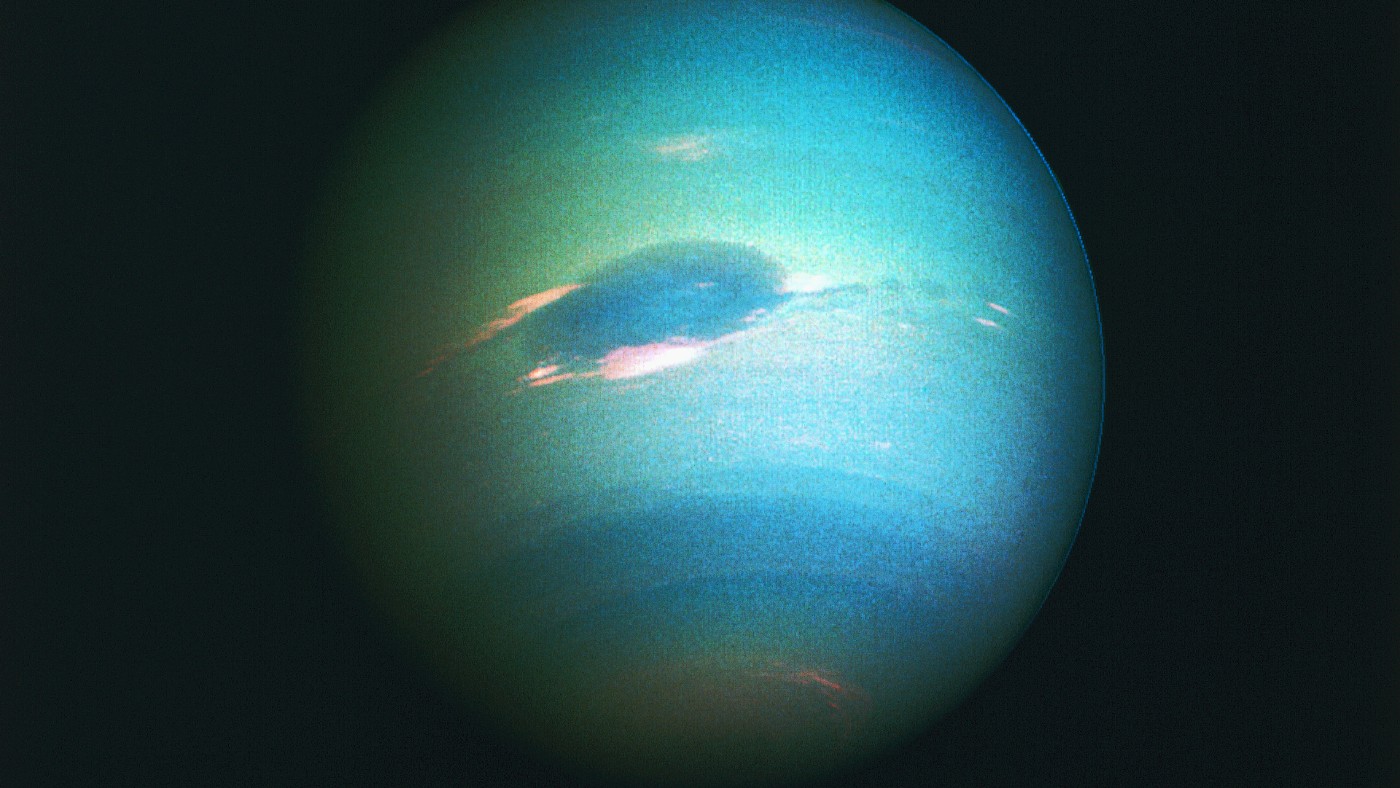New images reveal Neptune and Uranus in different colours than originally thought
Voyager 2 images from the 1980s led to 'modern misconception'

A free daily email with the biggest news stories of the day – and the best features from TheWeek.com
You are now subscribed
Your newsletter sign-up was successful
The two most distant planets in our solar system look more like each other than was previously thought, experts have found.
Many people think of Neptune as being a rich blue colour, and Uranus more green, but a team from the University of Oxford found that the two ice giants, are actually a "similar shade of greenish blue", said Sky News.
The perception of Neptune as much darker and bluer than Uranus was "cemented" when pictures were sent back by the Voyager 2 probe after it flew by the two planets in 1986 and 1989, said The Times.
The Week
Escape your echo chamber. Get the facts behind the news, plus analysis from multiple perspectives.

Sign up for The Week's Free Newsletters
From our morning news briefing to a weekly Good News Newsletter, get the best of The Week delivered directly to your inbox.
From our morning news briefing to a weekly Good News Newsletter, get the best of The Week delivered directly to your inbox.
Although Voyager 2 was a "monumental success", said the Daily Mail, it "actually resulted in the modern misconception of what the two planets look like".
The images it took in single colours "combined to create composite images that showed the planets to be cyan and azure, respectively", said Space.com. But experts have found that the images of Neptune, which is named after the Roman god of the sea, were made "artificially too blue" when handled by Nasa.
Colour images of planets are "highly processed" and "may not reveal the true colour the human eye would see", explained Patrick Irwin, professor of planetary physics at the University of Oxford, who led the new study, on The Conversation. Particularly in the case of Neptune, the composites were often made too blue.
Although the "artificially saturated colour was known at the time amongst planetary scientists", and the images were "released with captions explaining it", that distinction "had become lost over time", Irwin added.
A free daily email with the biggest news stories of the day – and the best features from TheWeek.com
Other experts have welcomed the news. Dr Heidi Hammel, of the Association of Universities for Research in Astronomy, told Sky News that the "misperception of Neptune's colour, as well as the unusual colour changes of Uranus, have bedevilled us for decades", but the new study "should finally put both issues to rest".
Chas Newkey-Burden has been part of The Week Digital team for more than a decade and a journalist for 25 years, starting out on the irreverent football weekly 90 Minutes, before moving to lifestyle magazines Loaded and Attitude. He was a columnist for The Big Issue and landed a world exclusive with David Beckham that became the weekly magazine’s bestselling issue. He now writes regularly for The Guardian, The Telegraph, The Independent, Metro, FourFourTwo and the i new site. He is also the author of a number of non-fiction books.
-
 The ‘ravenous’ demand for Cornish minerals
The ‘ravenous’ demand for Cornish mineralsUnder the Radar Growing need for critical minerals to power tech has intensified ‘appetite’ for lithium, which could be a ‘huge boon’ for local economy
-
 Why are election experts taking Trump’s midterm threats seriously?
Why are election experts taking Trump’s midterm threats seriously?IN THE SPOTLIGHT As the president muses about polling place deployments and a centralized electoral system aimed at one-party control, lawmakers are taking this administration at its word
-
 ‘Restaurateurs have become millionaires’
‘Restaurateurs have become millionaires’Instant Opinion Opinion, comment and editorials of the day
-
 NASA’s lunar rocket is surrounded by safety concerns
NASA’s lunar rocket is surrounded by safety concernsThe Explainer The agency hopes to launch a new mission to the moon in the coming months
-
 Nasa’s new dark matter map
Nasa’s new dark matter mapUnder the Radar High-resolution images may help scientists understand the ‘gravitational scaffolding into which everything else falls and is built into galaxies’
-
 Moon dust has earthly elements thanks to a magnetic bridge
Moon dust has earthly elements thanks to a magnetic bridgeUnder the radar The substances could help supply a lunar base
-
 How Mars influences Earth’s climate
How Mars influences Earth’s climateThe explainer A pull in the right direction
-
 The ‘eclipse of the century’ is coming in 2027
The ‘eclipse of the century’ is coming in 2027Under the radar It will last for over 6 minutes
-
 NASA discovered ‘resilient’ microbes in its cleanrooms
NASA discovered ‘resilient’ microbes in its cleanroomsUnder the radar The bacteria could contaminate space
-
 Artemis II: back to the Moon
Artemis II: back to the MoonThe Explainer Four astronauts will soon be blasting off into deep space – the first to do so in half a century
-
 The mysterious origin of a lemon-shaped exoplanet
The mysterious origin of a lemon-shaped exoplanetUnder the radar It may be made from a former star